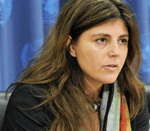Interview to the Special UN Rapporteur for Human Rights and Extreme Poverty
Published on Tue, 2013-05-07 12:55
Interview with Magdalena Sepúlveda, Special UN Rapporteur for Human Rights and Extreme Poverty What are the Guiding Principles on Extreme Poverty and Human Rights? They are a set of human rights norms recently adopted by the UN Human Rights Council. They provide, for the first time, global policy guidelines validating specific obligations incumbent on States with respect to persons living in extreme poverty. The Principles target the considerable obstacles of a social, cultural, economic and structural nature faced by those living in poverty, which prevent them from enjoying the rights to which they are entitled, placing them at greater risk of suffering discrimination, stigmatisation, violence, poor health and a lack of access to education, thereby increasing and exacerbating the cycle of poverty generation after generation. Based on international human rights norms, the Principles act as a tool so that lawmakers ensure that public policies (including efforts to eradicate poverty) reach the poorest members of society and recognize the obstacles they face in order to access their rights, respecting and adjusting them. How can people in poverty get involved in this process? I think it’s fair to say that those living in poverty were the real driving force behind the need for the United Nations to develop these Principles. We cannot forget that Joseph Wresinski himself pushed the UN to draw up mechanisms to protect the rights of the poor. In this way, thanks to the work of ATD Fourth World, the poorest members of society participated in the consultations on what the Principles should cover. I must say that, for me, the formal and informal contributions of these individuals were a key part of the work undertaken. I should also say that when drawing up the Guiding Principles, I was able to take account of the perspectives held by those living in poverty whom I met in the countries as part of my work as Special Rapporteur. Those individuals shared their experiences and ideas on a wide range of issues with me, ranging from discrimination to social protection and ways of life. Why do we need the Guiding Principles? Those living in extreme poverty are often disregarded or left out by politicians, on account of the considerable obstacles they face in order to access and enjoy their human rights, obstacles relating to stigmatisation, discrimination, financial obligations and social structures, to name but a few. The obligations incumbent on States in this respect must be clarified. Many human rights violations affect these people far more than any other group. Discrimination against the poor is widespread and commonly accepted. Poverty is the main cause of vulnerability to discrimination and other human rights violations, in addition to the fact that the poor are generally victims of multiple and cumulative forms of discrimination (for instance, based on their ethnic background, gender or disabilities), thereby compounding their disadvantages. States therefore need guidance on how to perform their obligations in order to respect, protect and comply with the rights held by those living in extreme poverty. Do you think that the Guiding Principles will contribute to ensuring that the Post-2015 Development Goals fully implement human rights for all? I really hope so. That is the shared challenge we face. We must work together to ensure that the Post-2015 agenda truly reflects the voice of the poorest and most excluded members of our society. That is the main task; we face many obstacles, but I believe that if we are willing, we can work together to make our aspirations a reality. I am convinced that the adoption of the Principles is a cornerstone for the international community’s position with respect to national and international efforts to protect the rights of the poor. The Principles could have an important role to play in protecting and empowering those living in poverty throughout the world. Source: International Movement ATD Fourth World. Tags: |
SUSCRIBE TO OUR NEWSLETTER



